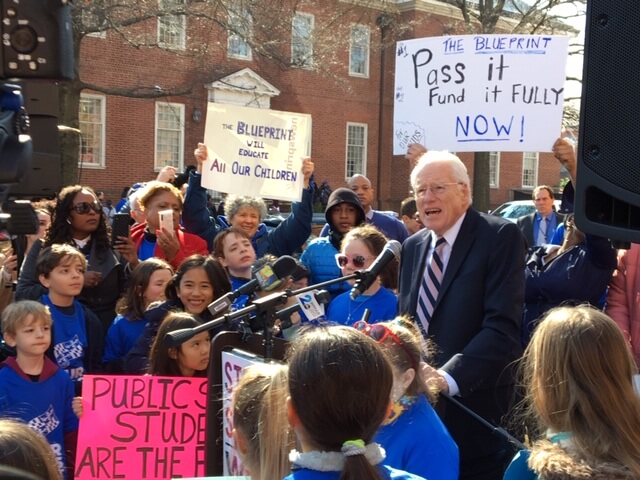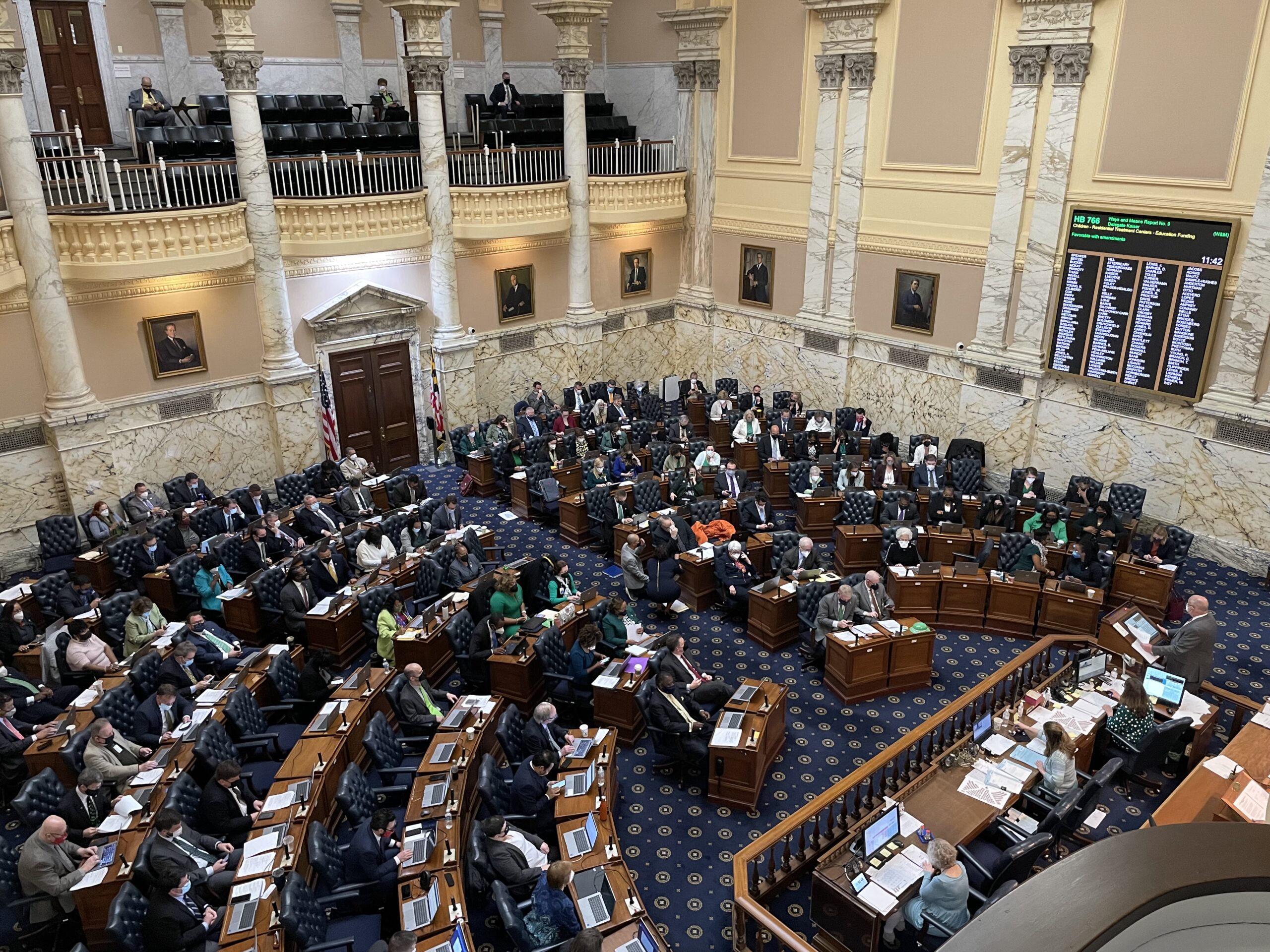Senate Panels Approve Education Reform Bill With A Potential Off-Ramp After Five Years

A Maryland Senate panel moved forward Wednesday with amendments to a multi-billion-dollar education reform plan ― including a provision that would require a “checkpoint” to test the success of the reforms by 2026.
The Senate’s Budget and Taxation and Education, Health and Environmental Affairs committees approved dozens of amendments to the Blueprint for Maryland’s Future reform bill late Wednesday night.
The “checkpoint” provision included by the Senate panels requires the state to conduct a review before the 2026 fiscal year to determine whether there’s sufficient funding for the final five years of the reform plan, whether reforms are being implemented according to the plan and whether schools are achieving desired outcomes. If one of the items is not met, increased state funding per child would be limited to 2% in the 2026 fiscal year and local school systems would not be required to further implement the Blueprint reforms.
The proposal generated debate among senators.
Sen. Mary L. Washington (D-Baltimore City) said the amendment felt like “an escape hatch” that could derail the ambitious education reform plan.
“I just can’t vote for this. I feel like it takes away from everything we’re doing. It doesn’t give me confidence that we’re fully committed to making it work,” Washington said. “…This really detracts from the whole mission.”
Education, Health and Environmental Affairs Committee Chairman Paul G. Pinsky (D-Prince George’s) said he was sympathetic to Washington’s mindset. But if the state doesn’t have dedicated funding for the reform plan, it wouldn’t be able to move forward at that point anyhow, he argued.
Lawmakers plan to pass a series of tax bills this legislative session to fund the first half of the reform plan, but more revenue changes will likely be needed to reach the proposed $4 billion increase in education spending levels anticipated by 2030.
“We know that if we don’t come back and raise money for the second five years of this, it goes away. It’s basically publicly acknowledging that,” Pinsky said. “…Is it undercutting our commitment, or is it showing our willingness to be accountable?”
Washington cast the lone “no” vote against the amendment in her committee.
Senators also included other amendments that garnered bipartisan support, including restoring the governor’s role in choosing members of an Accountability and Implementation Board. The House of Delegates passed a bill that included a nominating process that put legislative leaders in charge of choosing the majority of members for a nominating panel that would choose members of the accountability board. The House bill also required the governor to appoint the panel’s nominees, subject to confirmation in the Senate.
Senators on Wednesday struck the House provisions and made two changes: requiring 4-person majority votes of the 6-member nominating panel to include at least one affirmative vote by a gubernatorial appointee, and requiring the nominating panel to present the governor with nine potential board members to fill seven positions.
The governor’s lack of power in choosing members for the accountability board was a source of debate and partisan resentment during the floor debate in the House of Delegates last week.
The Senate committees also came together around a multi-page amendment crafted by a bipartisan group of members that would create a Maryland Consortium on Coordinated Community Supports that would provide grants to help address students’ behavioral health. The funding would begin in the 2022 fiscal year with $25 million and increase to $125 million by 2026.
The provision aims to address concerns about students’ mental health and establishing positive classroom environments throughout the state.
Sen. Arthur Ellis (D-Charles) voted against the provision, which he argued could stigmatize poor kids in particular and “create a long-lasting trail of unemployability for these children.”
Sen. Katie Fry Hester (D-Howard), who helped draft the provision, said she understood Ellis’ concerns, but believed that students from all walks of life are dealing with mental and behavioral issues that could be addressed by the proposal.
“At a time when we’re investing billions of dollars in education, I just feel like these kids need to have food, and they need to have a good sound mind,” Hester said.
Washington said she agreed with both senators ― that students from all backgrounds face mental health challenges, but that stigmatization or the ability to overcome negative consequences of treatment varies by race and class. The committee agreed to include additional language to emphasize de-stigmatization in the consortium’s work.
Several other proposed amendments from committee members failed to garner majority support. Sen. Jason C. Gallion (R-Harford) proposed several changes that would have yielded cost-savings in the reform plan, including to reduce the number of teaching scholarships by $16 million and to reduce the expansion of the state’s Judy Center network of early education hubs to save about $12 million. Both amendments were rejected in partisan committee votes.
The Senate’s version of the Blueprint bill includes amendments aimed at bolstering the ranks of highly qualified teachers in the state. The Senate bill would begin providing financial incentives to teachers who seek National Board Certification in 2022 ― two years earlier than the House bill ― and would set a statewide standard of $60,000 for starting teacher salaries by 2027, three years earlier than the bill originally contemplated.
Pinsky said the amendments are necessary to ensure the state has the teaching workforce necessary to carry out the goals of the reform plan.
Washington also proposed an amendment that would require local school systems to increase the salaries for other school workers ― reading instructors, custodial staff, secretaries and others ― by at least $3 per hour. The Budget and Taxation Committee did not move forward on the proposal, but plans to consider the idea further, for possible inclusion in the bill during the conference committee process, Chairman Guy J. Guzzone (D-Howard) said.
In a pair of marathon meetings that stretched late into the night, the Senate panels considered more than 90 amendments, attaching more than five dozen to the House version of the Blueprint bill.
The bill and was passed out of the education committee without Republican support, but passed the budget committee unanimously.
“From the policy aspects, I feel like this is a lot better than the bill that came over from the House, but I still have a lot of questions about the funding formula and the price tag,” Gallion said in explaining his vote. He was joined in voting against the amended bill by Republican Sens. Jack Bailey (St. Mary’s), Mary Beth Carozza (Lower Shore) and Bryan W. Simonaire (Anne Arundel).
‘The most inclusive process’
On the budget panel, Sen. Adelaide C. Eckardt (R-Middle Shore) said she still had some concerns about funding, but appreciated the collaborative process during the committee’s deliberations and supported the committee’s work.
“This has probably been the most inclusive process I’ve participated in in a long time,” Eckardt said. “…I do think it’s the right thing to do. And I think it’s well done.”
The bill could be considered on the Senate floor as early as Friday.





 Creative Commons Attribution
Creative Commons Attribution